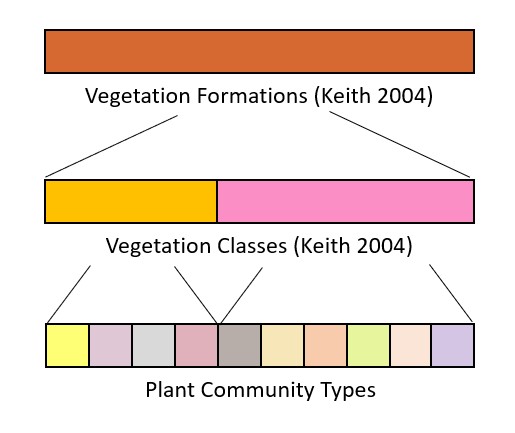The hierarchy communicates information about the patterns and characteristics of native vegetation with increasing complexity and detail as you work down through each level.
The NSW vegetation classification hierarchy

NSW vegetation classification hierarchy chart
Vegetation Formations
Vegetation Formations are broad groups distinguished by major structural and physiognomic features.
There are 12 Vegetation Formations recognised for New South Wales (Keith 2004 Ocean Shores to Desert Dunes: The Native Vegetation of New South Wales and the ACT).
Information about each Vegetation Formation can be found in the Threatened Species app.
Vegetation Classes
Vegetation Classes are groups of related plant communities that share floristic similarities and are generally united by similar structure and habitat.
Each Vegetation Class is assigned to a particular Vegetation Formation. There are 99 Vegetation Classes recognised for New South Wales (Keith 2004 Ocean Shores to Desert Dunes: The Native Vegetation of New South Wales and the ACT).
Information about each Vegetation Class can be found in the Threatened Species app under their assigned Vegetation Formation.
Plant Community Types (PCTs)
PCTs identify and describe recurring patterns of native plant species assemblages in relation to environmental conditions (soil, temperature, moisture and other factors). Each PCT has standard attributes that describe the floristic composition, structure, habitat and distribution across New South Wales.
For more information about PCTs, visit the NSW PCT classification webpage.
The master list of PCTs is held in the BioNet Vegetation Classification application.
The State Vegetation Type Map (SVTM) maps all levels of the NSW vegetation classification hierarchy.